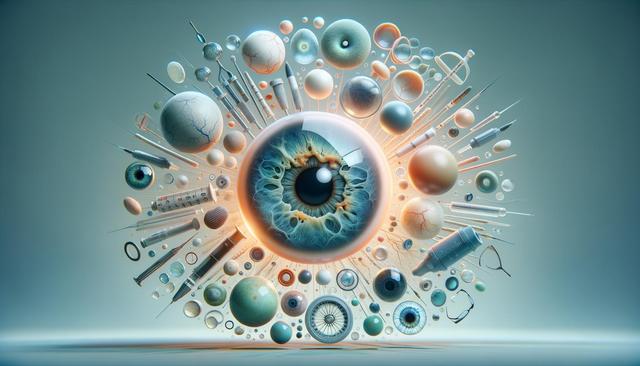
A Comprehensive Guide to Macular Degeneration
What Is Macular Degeneration?
Macular degeneration is a progressive eye condition that primarily affects the macula, a small but vital part of the retina responsible for sharp, central vision. This condition is one of the leading causes of vision loss among individuals aged 50 and older. Although it typically does not result in complete blindness, it can significantly impact daily tasks such as reading, driving, and recognizing faces. Understanding macular degeneration is essential for early detection and timely management.
The condition exists in two primary forms: dry (atrophic) and wet (neovascular). Dry macular degeneration is the more common type and progresses slowly over time. It is characterized by the thinning of the macula and the accumulation of drusen, which are tiny yellow deposits. Wet macular degeneration is less common but more severe, involving abnormal blood vessel growth under the retina that can leak fluid or blood, leading to rapid vision loss.
Recognizing the early signs of macular degeneration can help individuals seek medical attention sooner. Common symptoms include blurry or distorted central vision, difficulty seeing in low light, and the appearance of dark or empty areas in the center of vision. Regular eye exams are crucial for early diagnosis, especially for those at higher risk.
Understanding Macular Degeneration: Causes and Risk Factors
Several factors contribute to the development of macular degeneration, and while the exact cause remains unclear, both genetic and environmental influences are believed to play a role. Age is the most significant risk factor, with individuals over 60 being at higher risk. However, knowing the causes and risk factors can empower individuals to make informed choices about their eye health.
Key risk factors include:
- Family history of macular degeneration
- Smoking, which doubles the risk of developing the disease
- High blood pressure and cardiovascular issues
- Obesity and a diet lacking in nutrients such as antioxidants
- Excessive exposure to ultraviolet light
Genetics also play a critical role. Certain genetic variants have been linked to a higher likelihood of developing the condition. Individuals with a family history should consider more frequent eye screenings and lifestyle adjustments to mitigate these risks.
In addition to inherited traits, lifestyle choices have a significant impact. Diets rich in leafy greens, fish, and colorful fruits can support eye health. Regular physical activity, avoiding smoking, and managing chronic conditions like hypertension can also reduce risk.
Symptoms and Diagnosis
Macular degeneration often develops gradually, especially in its dry form, making it difficult to notice until vision loss occurs. Recognizing common symptoms and getting a proper diagnosis early can make a significant difference in managing the condition effectively.
Typical symptoms include:
- Blurry or fuzzy vision
- Difficulty reading small print or seeing details
- Distorted vision where straight lines appear wavy
- Dark or blind spots in the center of vision
- Colors appearing less vibrant or clear
To diagnose macular degeneration, eye care professionals use a variety of tests. One common method is the Amsler grid, a simple tool that helps detect vision distortions. Additional tests may include optical coherence tomography (OCT), which provides detailed images of the retina, and fluorescein angiography, used to identify leaking blood vessels in the wet form of the disease.
Regular comprehensive eye exams are essential, particularly for individuals over 50 or those with known risk factors. Early detection allows for closer monitoring and timely intervention, which can slow the progression of the disease and preserve vision.
Treatment Options and Management
Currently, there is no cure for macular degeneration, but various treatments can help slow its progression and manage symptoms. The approach depends on whether the condition is dry or wet. Understanding the available treatment options can help individuals make informed decisions about their care.
For dry macular degeneration, treatment focuses on lifestyle changes and nutritional support. The AREDS (Age-Related Eye Disease Study) formula, which includes high doses of vitamins C and E, zinc, copper, and beta-carotene or lutein and zeaxanthin, has shown to reduce the risk of progression in intermediate and advanced stages.
Treatment options for wet macular degeneration include:
- Anti-VEGF injections: These medications inhibit the growth of abnormal blood vessels and reduce fluid leakage.
- Photodynamic therapy: A light-sensitive drug is injected and activated by laser to destroy abnormal vessels.
- Laser therapy: High-energy lasers are used to seal leaking blood vessels, though this is less common now due to newer treatments.
Alongside medical treatments, patients are encouraged to use visual aids such as magnifiers or special glasses and make home modifications for better lighting and contrast. Ongoing follow-up with an eye care professional is crucial to monitor changes and adjust treatment strategies as needed.
Tips for Living with Macular Degeneration
Living with macular degeneration can present daily challenges, but with the right strategies and support, individuals can maintain a good quality of life. Adapting to vision changes and implementing helpful tools and resources can make a significant difference.
Some practical tips include:
- Using high-contrast and large-print materials
- Installing brighter lighting in key areas like kitchens and reading spaces
- Utilizing electronic devices with voice commands or screen magnification
- Organizing home environments to reduce clutter and improve safety
- Joining support groups for emotional and practical support
Rehabilitation services and occupational therapy can also help individuals adapt to vision changes. These professionals can provide training and tools to maximize remaining vision and maintain independence in daily activities.
Staying informed about new developments in macular degeneration research and being proactive in eye health management are vital steps. While the condition can be life-altering, many find that with the right support system and lifestyle adjustments, they can continue to lead active and fulfilling lives.
Conclusion: Managing a Lifelong Eye Condition
Macular degeneration is a common yet complex eye condition that requires awareness, early detection, and consistent management. By focusing on understanding macular degeneration, causes and risk factors, individuals can take proactive steps to protect their vision. Whether through regular eye exams, adopting a nutrient-rich diet, or exploring available treatments, there are many ways to cope with this condition effectively. Empowering yourself with knowledge and seeking timely care can make a considerable difference in preserving your sight and maintaining your quality of life.


